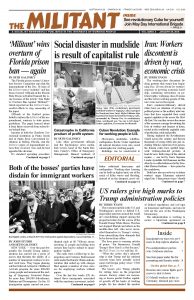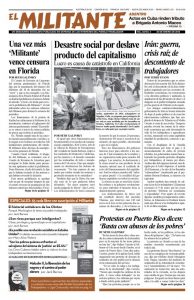Pussy Riot members Maria Alyokhina and Nadezhda Tolokonnikova became known around the world for performing a “punk prayer” against the regime of President Vladimir Putin in Moscow’s Russian Orthodox Cathedral of Christ in February 2012 that led to two-year prison sentences for “hooliganism motivated by religious hatred.”
They were sent to separate penal colonies in the Siberian Gulag. While in prison they organized with fellow prisoners to fight horrendous work and living conditions. They both went on hunger strikes several times and won release in December 2013.
“My brigade in the sewing shop works 16 to 17 hours a day from 7:30 a.m. to 12:30 a.m.,” Tolokonnikova wrote in a five-page open letter from prison. “At best we get four hours of sleep a night. I demand we be treated like human beings. I will not remain silent, resigned to watch as my fellow prisoners collapse under the strain of slavery-like conditions.”
In a lengthy interview with the Financial Times printed Jan. 5, Alyokhina explained why the fight against prison conditions in Russia has been at the center of what they do since getting out of jail.
“People came up to me and Nadya and said, ‘Girls, if you don’t change this, if you don’t tell people about it, then no one will,’” she said. “I’ve got five huge cardboard boxes in my attic with all the letters that people sent me for the two years I was in prison. They told their own stories. And for many people our story became the reason for changes in their life.”
Alyokhina and Tolokonnikova helped set up Zona Prava, a human rights group, and Mediazona, a news site that focuses on the injustices of Russia’s court and prison system.
Alyokhina explains she refuses to stop speaking out or to be driven out of Russia.
Over the past two years Alyokhina has performed her play “Burning Doors” with the Belarus Free Theatre, including in the U.S., United Kingdom, Australia and Italy. It tells her own story and that of two other targets of Moscow’s repression — Oleg Sentsov, a Ukrainian nationalist and filmmaker from Crimea, and Russian performance artist Petr Pavlensky, who sewed his lips together to protest the jailing of the Pussy Riot members.
In August, Alyokhina was arrested in Yakutia, Siberia, where Sentsov is detained. Along with another Pussy Riot member she hung a large banner saying “Free Sentsov” across a bridge near the prison.
Sentsov was framed up on charges of being part of a “terrorist conspiracy” and sentenced to 20 years. He had helped to deliver food to Ukrainian soldiers trapped on their bases following Moscow’s occupation of Crimea in February 2014.
“It’s important to be consistent,” Alyokhina says. “Don’t quit what you’ve started, don’t give up, don’t walk away. It’s important that those aren’t just words.”

